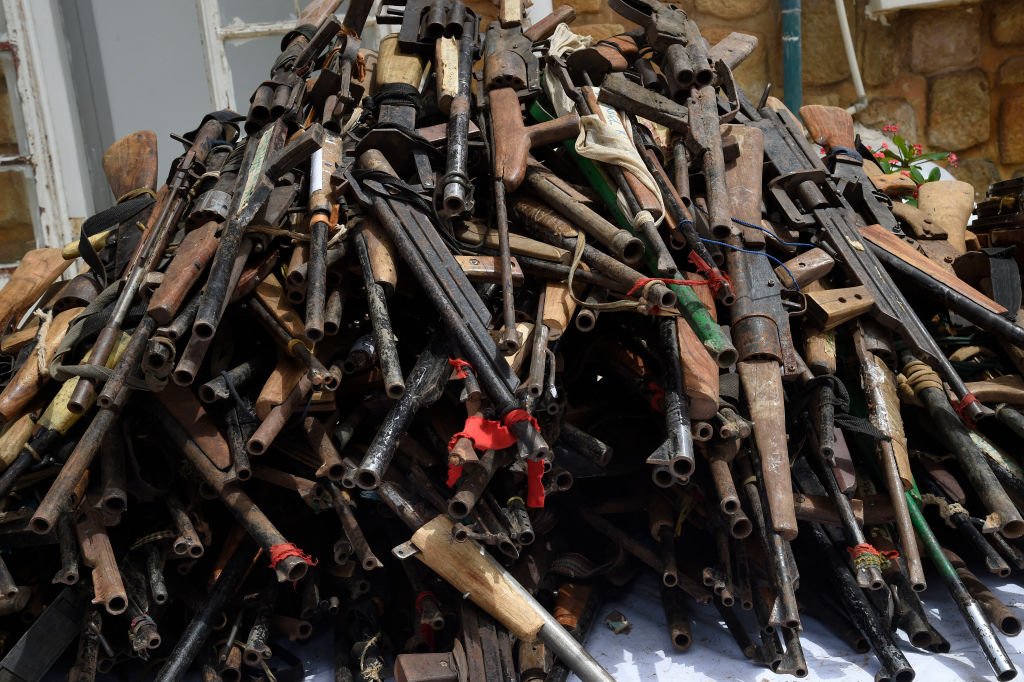ADF STAFF
Political instability, disputes between farmers and herders, unemployment, ethnic divisions, and the rise of extremist organizations are among the factors driving the spread of small arms and light weapons in the Sahel and West Africa.
Experts who participated in a webinar titled “Drivers and Impact of Arms Trafficking in West Africa” had various ideas on how to control the proliferation of weapons, but all agreed it starts with improved security. The event was hosted by the Institute for Security Studies (ISS) in mid-October.
The rise of violent extremist groups and other armed groups precipitated the demand for small arms and light weapons in the region, according to Oluwole Ojewale, a regional organized crime observatory coordinator at ISS.
Ojewale recently authored a report on arms trafficking in urban areas such as Lagos, Nigeria, a hub for weapons trafficking.
“As cities continue to grow, people come into the cities with the prospect of getting employment and when they can’t get employment they take to street crimes or traffic robbery,” Ojewale said. “What is also linked to this is the availability of the market and guns being seen as a livelihood for people who are producing them blacksmiths.”
In Bamako, Mali, instability driven by the rise of extremist organizations fuels demand for weapons.
“You can go on recruiting members and go on radicalizing them, but if you have little access to arms there is little they can do in terms of creating violent attacks,” Ojewale said.
Political instability is one of the major drivers of weapons trafficking in northern Nigeria, the Lake Chad region and Burkina Faso, according to Idris Mohammed, chief executive officer of the Sulhu Development Initiative, a nongovernmental humanitarian organization.
Mohammed, who is from northwest Nigeria, noted that several studies have shown that many of the weapons circulating today can be traced back to former Libyan ruler Moammar Gadhafi’s vast stockpile.
“In 2012 or 2013, you could go to the nearby community and get the weapon and live ammunition for $10,” Mohammed said. “You can acquire very sophisticated weapons. They were abundant. It was like when you go to the market to buy rice or maize.”
Banditry and never-ending battles between farmers and herders also drive people to buy weapons for self-defense, especially if people think their government is unable to protect them, he said.
Weapons also are attractive to young people in impoverished areas.
“When you have an AK-47 you become a well-celebrated person in your community,” said Mohammed, who added that trafficking thrives due to porous borders, lack of security and corruption.
Mutiat T. Oladejo of the Obinrin Afrika Initiative for Research and Development said women are involved in arms trafficking in various capacities.
“They are procurers, they are pilots, they are purchasers, they are couriers, and they also gather information as to directions or routes that are safe to pass through,” Oladejo said. “They are also intermediaries and brokers.”
Curtailing the flow of illegal weapons is a complicated challenge. Some of the experts called on individual nations to address the issue, which would complement global efforts made by the United Nations Office for Disarmament Affairs and regional efforts such as the Economic Community of West African States (ECOWAS) Small Arms Convention.
Under the ECOWAS Convention, member states agree to control, regulate and prohibit the transfer, manufacture, and possession of small arms and light weapons.
However, as Dr. Sani Adamu, acting head, peace support operations of the ECOWAS Commission noted, the convention obligates each member state to create a national commission tasked with combatting illegal weapons trafficking through an act of parliament. He singled out Nigeria for failing to do so.
“Are we actually fully ready to respond to the challenges?” Adamu said. “There has been a paradigm shift in fighting this fight, moving from the center to community levels, looking at the fringes of the country. Are we actually putting in place these measures to fight this fight?”

